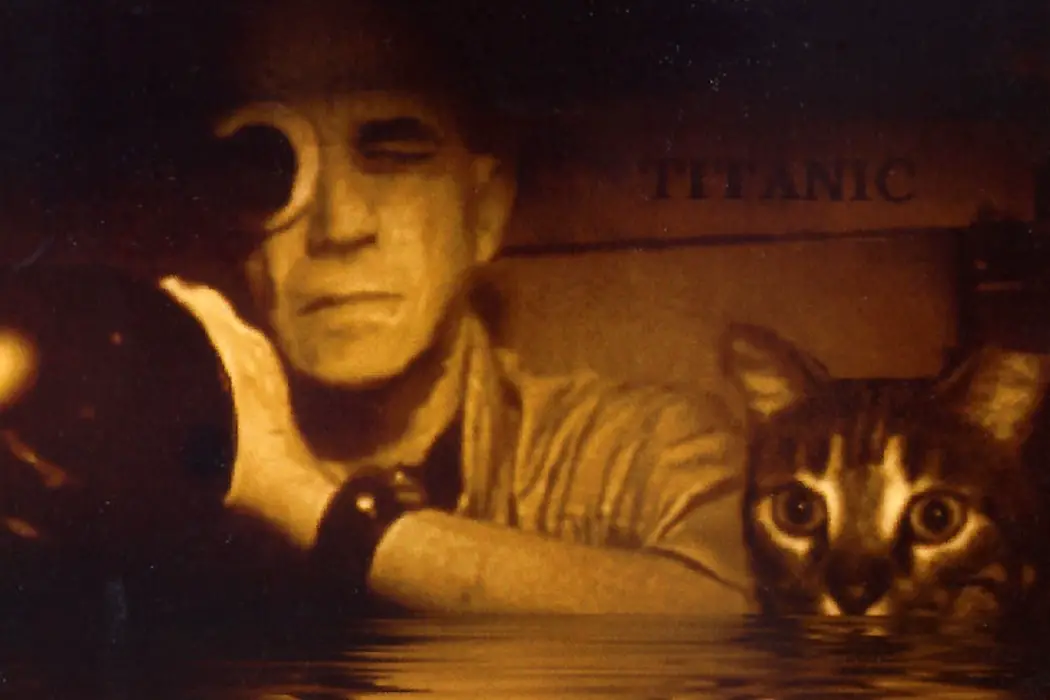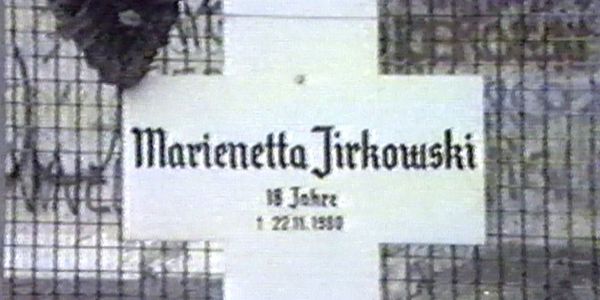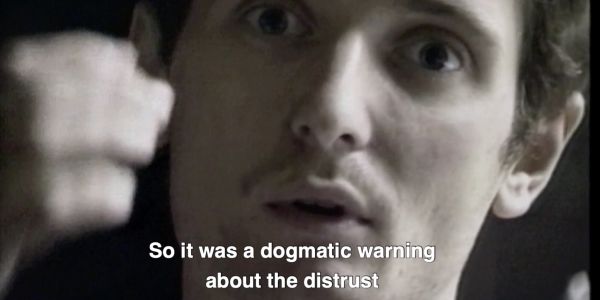Chris Marker Centennial Trio: Berliner Ballade, Blue Helmet, Prime Time in the Camps

Massive film lover. Whether it's classic, contemporary, foreign, domestic, art,…
Chris Marker: is there any word, term, or appropriate classification for his work? Probably best known for his deliriously immersive time-traveling montage La Jetee (the inspiration for Terry Gilliam’s 12 Monkeys) alongside his free form, pseudo-documentary/travelogue Sans Soleil he’s eschewed categorization with his beyond idiosyncratic body of work.
If you’ve even grazed his filmography, it’s easy to see why Marker is such a topic of distinction. At times meditative, poetic, philosophical, and impressionistic, with multiple sojourns into politically charged, historically conscious fare (A Grin Without a Cat, The Last Bolshevik), Marker is both an allusive aesthete and inquisitive documentarian whose fertile imagination and mysterious demeanor make him one of the cinemas most transcendent artist.
Thanks to Marker’s reclusive persona (he makes Kubrick look like an extrovert), the arrival of his centennial makes it feel as if he’s still out there despite passing at the age of ninety-one in 2012. However, there’s still some bursts of life emerging from his body of work, and thankfully, Ovid Films has excavated some of the late-directors harder to find titles.
The three short films, Berliner Ballade, Blue Helmet, and Prime Time in the Camps, hail from the nineties, a time when French cinema was in a downswing as television and the marauding presence of eastern media. Almost like Godard’s Dviga Vertov period, Marker also took on a more Brechtian approach to directing. Naturally, Marker’s penchant for mixed media artistry was flattered by the inclusion of video recording, CD-ROM, and the accessibility/saturation of world events in the post-Berlin Wall, twenty-four-hour news cycle culture.
Berliner Ballade: The Wall, Before and After
The threat that ties this trio of titles together are the concise runtimes (each ranges from 20-30 minutes), shared political discourse, a threadbare DIY aesthetic, and the kind of contextual distancing that permeated the politicized subterfuge of French cinema of the late-eighties to the early nineties.
Berliner Ballade is a candid look at the cultural climate surrounding the titular city before and after the fall of the divisive symbol that loomed as a totem to the stagnant endgame of communism. And Marker turns his camera toward this totem and collects, in his trademark elliptical investigative footage while integrating archival materials and music to stunning effect.
France 2 (for the Envoye Special program) dispatched Marker to record the events leading up to the document the first free election in East Berlin; what he created, Berliner Ballade, was not to their liking, ergo this presentation is the first time it’s available in its complete form.

Marker’s brevity doesn’t sacrifice quality, as Berliner Ballade is a potent slice of investigative essay-style filmmaking that feels both artful and urgent in its guerilla execution. Cutting footage culled from his trip with footage prior to the fall of the Berlin Wall, along with clips from WWII newsreels, Marker spins a collage of hypnotic images. People making a business selling chiseled out hunks of the Wall to friends/family members of those who died trying to cross it. We see these souvenirs lying in front of their graves, many of which are only meters away from the still-standing barrier of concrete – furthermore, many of these tombs read “unbeknownst,” reminding us how many of the fallen were unidentified.
At times Berliner Ballade plays off with a wry sense of ironic juxtaposition, opera, classical arrangements, and most importantly, folk songs are sung alongside images of soldiers, enthusiastic German’s taking to the streets, Hitler’s motorcade, and some haunting, greasy slow-motion marching. It’s all haunting and evocative and serves as the emotive backbone.
Berliner Ballade looks back as well as forward, reminding us of a history that’s all the far away from us and a future that might not be as bright as the left-wing desired. As we reach the end, the Christian Democratic Union (CDU) carries off with the win, but the future is still uncertain for the city whose just starting to thaw out from the past twenty-eight years.
Blue Helmet: Out on Patrol
The most straight-forward of the lot, Blue Helmet is a blunt, to-the-point short that’s mostly an interview with François Crémieux, who served in the Bosnian town of Bihać as a peacekeeper for the UN as a French peacekeeper for six months in 1994, a period when tensions in Bosnia were still hot. The conflict hadn’t come to an official close.
From the jump, Blue Helmet announces itself pretty quickly. The runtime clocking in at twenty-five minutes, we know who our subject is, where Marker is taking us and how this will play out. It’s a tight close-up of Crémieux’s face and what’s most evident is that this young man needs to talk. In an almost jittery, unstable way, Crémieux’s candid profile and rapid-fire manner of speaking provide us with an air of unease.

There’s a perverse irony to Blue Helmet that speaks volumes to the sheer fallacy that comes with foreign intervention and the haughty colonialism that begets first world “peacekeeping” missions and foreign occupation. For the most part, Crémieux’s recollections aren’t harrowing; he’s not recounting stories of wartime heroism, dodging bullets, and holding down firefights. He does share tales of racist superiors dictating inane missions and directives that yield little to nothing for all intents and purposes. The overall effect of France’s role in Bosnia was nothing more than an exercise in diplomatic glad-handing.
It’s a no-frills exercise and functions with subtly affecting aplomb even if the entire show is threadbare in its presentation.
Prime Time in the Camps: Radio, Free Europe
In perhaps the most Godardian (in its Brecht–inspired subterfuge) effort, Prime Time in the Camps is Marker’s most meta-textual riff on media culture. Prime Time in the Camps revolves around an outsider gang of Bosnian refugees in Slovenia who work off pirated newscasts and TV signals to keep up on world events and record their renegade-style news program. Despite their ramshackle equipment, and the fact that their recordings will ever hit the airwaves doesn’t compromise their fortitude.

Prime Time in the Camps is probably the most dynamic title amid this trio and, in many ways, the hardest to interpret on any conventional level of analysis. In the tradition of Chris Marker, this shouldn’t come as a surprise, and within a short run time, he conjures up a punchy grab bag of thematic revision and tonal changeups. In some ways, it feels like a docu-meta riff with dystopian proportions; on the other, it’s also teeming with a vérité zeal as it deals with political refugees and the Bosnian War.
There’s a heady swirl to it all, and the multi-lingual dubbing (much of the dialogue is dubbed in English rather than subtitled) only adds to the alluring friction this title grinds out at you.
Have you seen any films by Chris Marker? Let us know in the comments below.
You’ll find all the Chris Marker films on OVID here:
Does content like this matter to you?
Become a Member and support film journalism. Unlock access to all of Film Inquiry`s great articles. Join a community of like-minded readers who are passionate about cinema - get access to our private members Network, give back to independent filmmakers, and more.
Massive film lover. Whether it's classic, contemporary, foreign, domestic, art, or entertainment; movies of every kind have something to say. And there is something to say about every movie.













